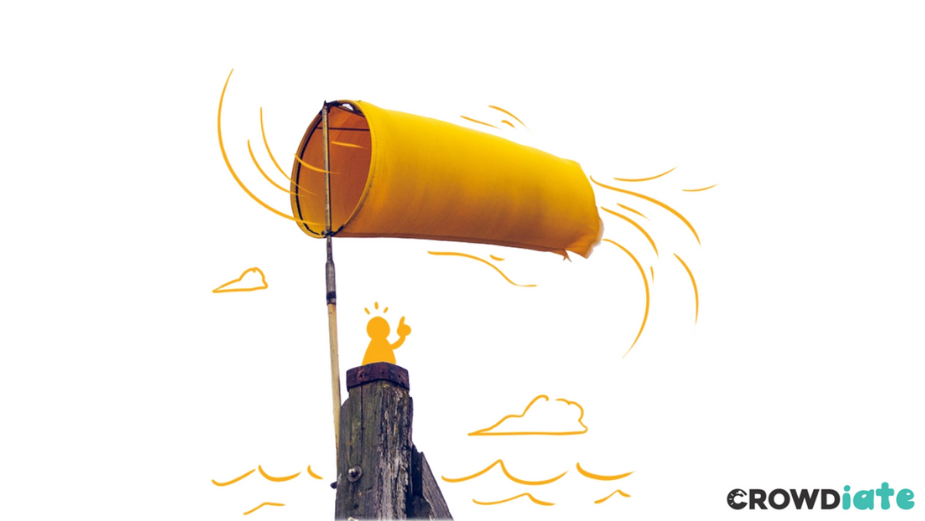
How Crowdiate Opened Up Creativity

“It’s all about the idea.”
That’s the core message greeting first-time visitors to Crowdiate’s website. And it doesn’t take long speaking to Aaron Nemoy (founder & CEO), Ian Mirlin (creative director), and Lisa McGillivray (client services director) to figure out that the self-described ‘ideas company’ has established a different approach to creative development - and it’s one which yields the kind of unexpected ideas that can often elude the conventional agency model.
What’s different about Crowdiate is their process. The company works with brand clients to develop a laser-sharp brief, and then out to their global community of select creative talent for the single-minded ideas by which, in the company’s view, strong brands are built and sustained.
For brands, the benefits are appealing. Rather than limiting a brief to the talent of a single agency, Crowdiate’s network offers the ability to harness a rich diversity of creative voices. It’s a process which has worked for the likes of Amazon, Campbell’s, and Philips for key advertising initiatives. Several other clients including Hershey’s, Reckitt and Dr. Oetker have successfully ideated new product innovation concepts using Crowdiate’s model.
With regards to remuneration for creatives, the best ideas are rewarded from a total prize pool that varies according to the size of the project. The attraction for creatives, then, is clear – varied and interesting briefs with an attainable financial reward.
To find out more about Crowdiate’s model, how the company came to life, and why the time is right for ‘truly democratic creativity’, LBB sat down with Aaron, Ian, and Lisa.
Above: Amazon Europe’s bright upbeat campaign announcing its new furniture lines, originated in Crowdiate’s creative community. Once the idea was approved, Crowdiate led the production process, supported by their network of trusted production partners.
Keeping It Brief
For Aaron Nemoy, ideas have always been his passion. “I was client-side for a decade, and I fell in love with creative strategy,” he tells LBB. “I really came to appreciate the value of big ideas in their ability to grow brands and drive business results. It kind of became my mission to elevate ideas and make them accessible.”
In Crowdiate, the company he co-founded, Aaron’s mission has borne fruit. “I’d always felt like there was an opportunity to do things differently,” he continues. “You’d have these fantastic competitions like Cannes Young Lions with a number of creative teams all trying to crack the same brief. I felt like we needed to make more of that, and make it available to any brand.”
As a Young Lions winner himself, Aaron is no stranger to the power of open-source ideation. Resultantly, after beginning his career in brand management he quickly became – in the admiring words of Ian Mirlin – a ‘stickler’ for excellent creative briefs.
“That’s one of the first things that I noticed after I started working with Crowdiate,” agrees Lisa McGillivray. “Both Aaron and Ian have this amazing ability to fine-tune a brief. They’ll deliberate over a single word which can, of course, make all the difference.”
Given the open-source nature of Crowdiate’s model, it’s easy to see why developing a clear and compelling brief is such an important part of the process. For Ian, the benefits of that process can be seen most clearly when the company’s curated concepts are taken back to the client. “At that stage, the client becomes our creative partner and we have some really thoughtful and objective conversations,” he explains, “because of course there’s no ego in the room, the idea has total primacy, everyone is invested in the same pursuit. That’s an aspect of Crowdiate which I think a lot of our clients tend to enjoy.”
Along every step of the way for each project, the company makes an effort to be in constant dialogue with the creative talent involved. “What we absolutely don’t want is for our creative people to feel like they’re throwing their ideas into a well, to be hopefully dredged up in the next bucketful,” explains Ian. “So we try to have as much one-on-one conversation as we possibly can while the project is in play.”
While their strategic orientation and personal touch certainly set Crowdiate apart from so-called ‘crowdsourcing’ platforms, the company is keen to avoid such comparisons, explains Aaron. “Ours is really more of a hybrid model in that we rely on our community for initial concepts, and then lead creative refinement and production, often involving the creative team who conceived the original idea.”
Above: ‘Behold the Souper You’ was, in the words of Campbell’s marketing VP Mieka Burns, “the most successful advertising on record for the company”. The campaign has been awarded an Effie for business turnaround.
A New Kind of Creativity?
One advantage of that constant dialogue with their global creative network is that the Crowdiate team have enjoyed a front-row seat for how creative culture has evolved amidst the pandemic and its various lockdowns.
“That word, ‘lockdown’, was something which I felt really powerfully at the start of the pandemic,” notes Ian. “I worried about what it might do to intimidate the creative imagination. Still, there has been some wonderful work produced during this challenging time. I should have known better than to doubt the never-say-die character of the creative spirit.”
From Aaron’s perspective, we’re witnessing trends grow out from roots which can be traced back to long before Covid-19. “The global shift to working remotely and the excellent creative people who are taking advantage of it, has been one trend we have definitely benefited from,” he says. “With a growing pool of experienced agency talent open to different ways of working, the model has never been more relevant.”
Part of Crowdiate’s appeal, then, can be found in the way it gives creativity space to breathe. For an industry which has often been drawn to a targeted and regimented, ‘battery farm’ approach, Crowdiate’s open-source model is positively free-range.
Ultimately, it’s a proposition from which there stands to be many winners. For brands, brilliant ideas that result from diverse thinking become part of the new normal. And for creatives, talent can start paying the bills sooner thanks to the company’s ideas-first approach, and democratic distribution of awards.
For an industry – and a world – too long mired in the mindset of lockdown, it appears that Crowdiate’s creative liberation has truly found its moment.













